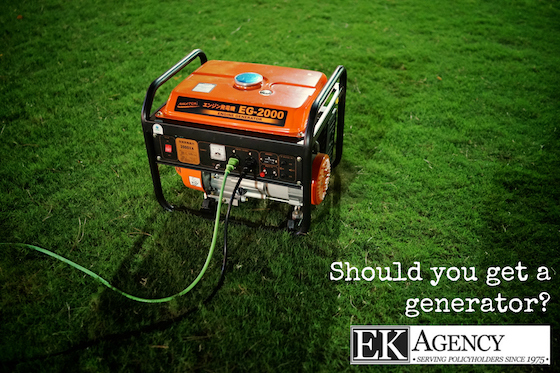
Did your power go out last weekend? Power outages are a major hassle: lack of Heat/AC, lights and electricity can really put a damper on your plans. Not to mention -- an outage can end up being quite costly. Whether you're reeling over losing precious work-from-home time or are lamenting your quickly warming refrigerator full of perishable food, a power outage can be more than a little inconvenient.
Enter: the generator. A portable, powerful little machine on standby for when you need it. But are generators really a good idea for most homeowners?
If you've ever considered purchasing a generator for your home, here's what you need to know:
1. Always use outside.
Generators emit carbon monoxide, which is quite dangerous if ingested. Keeping your generator outdoors will ensure you don't leak this dangerous gas into your home. Make sure to always run your generator outside, far away from windows or vents -- and never run it inside your home or garage. (This could be tricky during a severe storm!)
2. Keep your generator dry.
Generators pose a risk of shock and electrocution, especially if they are operated in wet conditions. As such, the U.S. Consumer Product Safety Commission (CPSC) advises that homeowners operate the generator under an open, canopy-like structure on a dry surface where water cannot reach it or puddle or drain under it. And be sure to dry your hands, if wet, before touching the generator. (Again -- this might be difficult if you're attempting to use your generator during a massive storm.)
3. Be wary of fire hazards.
Most portable generators are powered by gasoline, and having gas on hand poses a fire hazard. The National Fire Protection Association recommends consumers always store gas in a safe container far away from the generator. Use the same precautions you'd take around your gas grill or fuel for your lawn mower. And -- never refuel your generator when it’s running, warns the NFPA. When refueling the generator, always turn it off and wait for it to completely cool down before adding fresh fuel.
The Bottom Line? Portable generators can be helpful if you're dealing with frequent power outages, but they come with their own risks. Between the various safety hazards, you need to exercise extreme caution when handling these machines.
Your safest bet might just be lighting a candle -- and leaving the electrical work to the experts!
Source: U.S. CPSC, Portable Generator Hazards | National Fire Protection Association, Generator safety tips.
Photo credit: tablexxnx, generator.
Tags : generator, portable generator, severe weather, homeowner, safety,
 August 31 at 8:00am · Share August 31 at 8:00am · Share
|